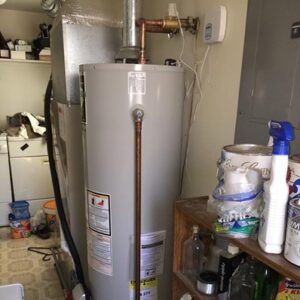Possible Reasons Your Water Heater Isn’t Working – Common Water Heater Problems


Your water heater is a critical component of your home, providing you with hot water and heating your family’s showers and baths. While it’s important to know how to maintain your water heater so that it continues to function properly, it’s also helpful to know what might cause problems with this appliance in the first place. If you’re noticing issues with your tank or gas model, here are some common reasons why they aren’t working properly.
Stay with us as we look at some of the reasons why your water heater may be experiencing problems. We look at some possible solutions as well.
Dirty Burner
A dirty burner can cause your water heater to not light. The burner may be clogged with debris from previous uses or maybe even by insects that crawled inside. This can lead to an improper amount of gas being applied, resulting in the flame not lighting up or burning properly.
When this happens, you will hear a clicking sound and notice that your pilot light has turned off but only momentarily before relighting itself again. If this is happening, there’s no need to worry; just wait around 30 minutes for the mixture of gases to stabilize before turning on anything hot (like your shower head).
You should hear a slight hissing noise once everything has been heated up; if you don’t hear anything after 30 minutes, try turning on something else hot such as another faucet, so that it heats up quickly.
Bad Gas Valve
The gas valve is responsible for turning the pilot light on and off. If the pilot light does not turn on, then it could be because of a bad gas valve. Signs of a bad gas valve include:
- A clicking sound when you turn the thermostat to high or low.
- No pilot light at all (the thermocouple may be faulty).
- The pilot light comes on but goes out within a few seconds or minutes.
To test if your gas line has any leaks, you can use an electronic leak detector that emits an electric current through your water heater’s hose lines and shuts off if it detects any flow of electricity through them (any flow indicates that there are cracks in your piping).
You will also want to check for signs of corrosion inside your tank by turning off its power source, removing its cover and inspecting its interior surfaces with a flashlight. If there are signs of rust or corrosion at any point within the heating chamber, then chances are good that something is wrong with those pipes too!
Lack of Combustion Air
If your water heater is located in a small room, such as a closet, it could be that there’s not enough oxygen to create adequate combustion. This is especially true when the heat source is electric or gas and there are no ventilation fans.
Also, if your water heater is located in a basement, garage, or attics—anywhere where there isn’t plenty of fresh air circulating—then this can also cause problems with combustion.
If you suspect that lack of oxygen may be interfering with how well your water heating works (or if you just want to ensure that everything is operating at maximum efficiency), try adding an exhaust fan or two to the room where your unit sits.
Faulty Thermostat
The thermostat is a common problem for water heaters, and replacing it can be an easy fix. First, turn off the power to your heater; if you’re not sure how to do this, consult a licensed electrician. Next, remove the faceplate that covers your thermostat by unscrewing it from its base using a screwdriver.
Once removed, locate and disconnect any electrical connections that might be attached to it before lifting out the old thermostat with needle-nosed pliers or a small prying tool (if necessary).
Now test both new and old thermistors by submerging them in ice cold water until they become brittle enough so that you can snap them easily in half with pliers (if they don’t break on their own). If one of these tests doesn’t work out well for you—or if neither did—throw both pieces away and get some fresh new ones; just make sure they match up with whatever style/brand of heater you have!
Signs it is Time to Buy a New Water Heater
It is time to buy a new water heater when:
- Your water heater is more than 10 years old. The average lifespan of a water heater is 8-12 years, depending on how often it is used. If your water heater has been in service for over 10 years, it may be time to replace it with a newer one.
- Your water heater is leaking or broken. An experienced plumber can fix some leaks at relatively low cost, but if you have been unable to stop the leak and your current system has reached its end of life, it’s time for a replacement rather than more repairs on an old model that can’t be fixed anymore anyway! A new tankless unit will save you money on gas bills (and help keep our environment healthy) right away without having any negative impact on how well your home heats up.
If your water heater is not working properly, there are a number of issues that can cause it. If you’re having trouble with yours, call a professional plumber because they will be able to help you identify the problem and find solutions for fixing it.
RECENT POSTS
categories
Archives
2024
2023
2022
2021
2020
2019
- December (2)
- November (2)
- October (2)
- September (2)
- August (2)
- July (2)
- June (2)
- May (2)
- April (2)
- March (2)
- February (2)
- January (2)

